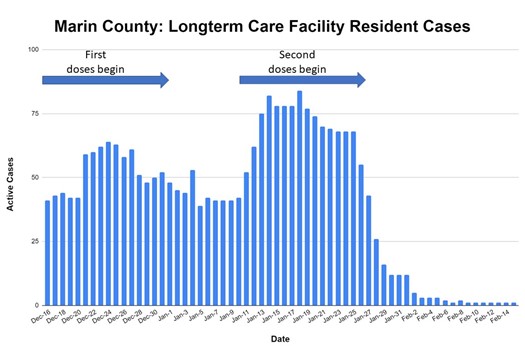COVID-19 Case Rates Drop in Senior Facilities Post-Vaccine

Public health agencies pleased with 10-fold decrease after second doses.
New data is showing the impact of a concerted effort to vaccinate residents and staff against COVID-19 in long-term care facilities across Marin County.
Skilled nursing and residential care facilities for seniors have been among the hardest-hit settings during the pandemic across the nation, and in Marin. After a multi-agency campaign to bring vaccines into facilities across Marin, cases have dropped more than 10-fold following the wave of second doses through January 2021 in both residents and staff.

COVID-19 cases at skilled nursing and residential care facilities has dramatically dropped in recent weeks.
Through January, there was an average of 60 active COVID-19 cases among residents of long-term care facilities across Marin. Thus far in February, that number dropped to a monthly average of four active cases, with no facilities experiencing outbreaks.
“This is one of our earliest and most highly vaccinated groups, and we’re seeing clear signs of protection,” said Dr. Matt Willis, Marin County Public Health Officer. “The vaccine is already saving lives in Marin.”
Leading up to the rollout of vaccinations, 85% of COVID-19 deaths were linked to cases within long-term care facility settings. Nearly one in five residents who was infected died.
The steep decline in cases begins approximately two to three weeks after the beginning of the distribution of second doses, which is in line with when the vaccine is considered effective, according to vaccine manufacturers.
Prior to the arrival of vaccine, mobile teams made up of Marin County Public Health, Kaiser Permanente, MarinHealth, and Marin Medical Reserve Corps members had assembled to rapidly deploy to long term care settings. The same teams helped support facilities with mass COVID-19 testing earlier in the pandemic.
“The first doses arrived on December 16, and within five days we’d vaccinated staff in all 13 of our skilled nursing facilities,” said Dr. Peter Reidy, a Kaiser Permanente physician who helped spearhead the collaboration. “This was a great example of what we can accomplish when we combine forces across public health and health care providers.”
The teams have continued to vaccinate in congregate living facilities across Marin, in parallel to the federal pharmacy partnership program with CVS and Walgreens staff providing vaccinations in long-term care facilities. In all, more than 5,000 staff and residents of some of Marin County’s most vulnerable congregate living settings have been vaccinated.
Currently, 68% of Marin County residents over age 75 have been vaccinated, as have 45% of the population above age 65.
“The success in our facilities predicts what we’ll see in the community as a whole,” Willis said. “Protecting our older residents allows us to move on to other groups when supplies allow, knowing we’ve protected those at highest risk for death.”
To help Marin residents track when they may be eligible to receive a vaccine, the County has offered an online interest form. Residents can answer a few questions to be subscribed to receive email, text message, or pre-recorded phone call notifications when their turn has arrived and how to pursue a vaccine appointment. The form is available in English, Spanish, Vietnamese and Chinese on Marin County Public Health’s vaccine webpage.
Everything a resident needs to know about the vaccination process can be read on coronavirus.marinhhs.org/vaccine, including frequently asked questions, and myths versus facts. Stay informed of progress by subscribing to Public Health’s daily status updates. The emails contain information on vaccine progress, announcements of when new vaccination phases open, and other relevant COVID-19 information.

